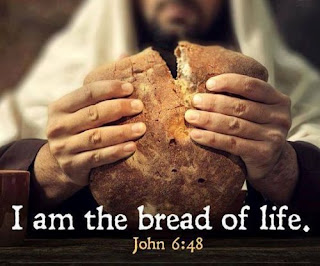How often have we read about Jesus’ healing the sick; restoring speech to the
impaired; sight to the blind, and hearing to the deaf? Somehow we have become
jaded to Jesus’ ability to perform miracles. I recall having read somewhere that the great mystery of the incarnation of God
in Jesus is not his divinity, after all God can do anything. But the true mystery is Jesus living his life fully human, just like us.
We spent most of this summer reading and discussing John’s Gospel. We delved
into what the mystical significance of the Bread of Life; the sharing of the
Bread, and what the Word becoming flesh in each of us means. Knowing the mystery of the Eucharist required that we suspend "belief" and palpably feel with our "gut" its meaning.
Striving to be in a “right relationship with God” is what being a
Christian means and what living the Word is what its all about, right? But what does being in a
right relationship with God really mean? Let’s close our eyes and picture how being in a right relationship "feels" for a minute. Note, I use the word “picture,” not “understand.” This
may prompt our imagination and senses to feel the words as a palpable,
sensory experience, and know what being in a relationship with God actually
feels like, tastes like, and smells like. "Albert Einstein said that the 'true measure of intelligence is not knowledge but imagination.' Being a disciple of Jesus Christ requires a great deal of imagination. It is not enough to simply attend to facts, rules and rituals and consider the job done. " ( St. Benedict Church Bulletin, August 29, 2021.)
God fully shared our humanity through Jesus as we through Jesus, fully share in
God’s divinity. Anything less than that relationship with God would be reduced
to being mere acquaintances. So, with this as our premise, we consider Mark 7:31-37 from the
perspective of both the healer and one who is in need of healing. Do we ever
think of ourselves as “healers”? Think of the times we listen, comfort and
support one another.
Sure, we know what it means to want to be cured or be free of pain, and we can
relate to medical professionals who are trained to provide healing.
But where does that leave us and what does this have to do with either Mark or John of our summer readings, and how the two Gospels relate? There are so many
ailments that are outside the bounds of a medical professional’s ability. But
yet, somewhere within resides our ability to reach out and heal or be healed. The
readings of John help us consider our Gospel in Mark with inspired eyes and
ears.
What is required for us to be healed or the healer or both? Why do we resist
the potential that resides within each of us? We hear but do not listen while
remarkable things happen all the time, and we dismiss them as “coincidences.”
“Our ministering and supporting one another morph into the essence of our
being and become who we are, as if they exist as an integral part of us. We
become ever changed by their existence. Like an encrusted stone picking up moss
while rolling down a hill, we are ever changed with each turn… And at the core
is "love" God's love. I suppose, this is what's meant by becoming the
Word. We need not speak of what we do, they describe us and speak quietly; and
we give thanks for them.” (Ministries 7/28/15)




